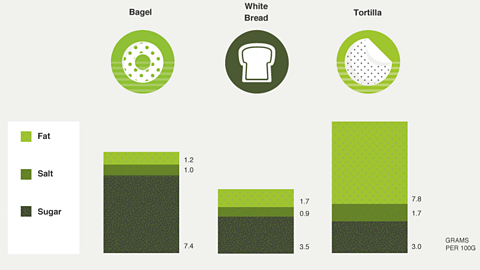Is bread bad for you?
by Dan Lepard, in association with nutritionist Azmina Govindji
Bread has been a staple of our diet since ancient times. Primitive people baked flat breads 12,000 years ago by mixing flour and water and baking them in the sun.
The Egyptians are thought to have discovered how to make risen bread with a starter made from wild yeast. Today, bread is sometimes demonised as a carbohydrate source that makes people fat, and it is often the first thing thrown out by dieters.
Some argue that industrial bread production means too many preservatives, additives and salt, making it unhealthy. But bread can be a good source of both carbohydrates and whole grains that are needed in a balanced diet.
Different breads have different properties. Instead of avoiding bread, knowing what is in each slice and watching how much of it you eat each day is usually the healthier course.
A tale of two loaves
When it comes to nutrition, which is better: homemade or shop-bought?
What's in your bread?
Various types of flour are used in bread making. Wholemeal flour is made from whole wheat grains, while white flour is made only from the central part of the grain, the endosperm.
Salt is needed to control yeast growth, make the dough more stretchy and enhance flavour.
Is one type of bread better than another?
All bread is a great source of carbohydrates, the body's energy fuel. But the carbohydrates in wholemeal bread are digested more slowly than those in the more refined white bread, and so keep you going for longer.
Wholemeal bread usually also contains more fibre and nutrients like vitamin B, calcium and iron, which tend to be lost in the white flour refining process – although some of these ‘micronutrients’ must now by law be put back into white flour after milling.
Factory-baked loaves may contain additional ingredients such as sugar, oil, vinegar, preservatives and flour treatment agents.
Which bread is healthiest?

Who should avoid bread?
Counting your calorie intake is a good idea if you want to lose weight. But of course it’s not just carbohydrates that pile on calories.
Some people avoid bread because they have an intolerance to wheat or gluten (a protein found in wheat). A smaller number of people are allergic to wheat.
Wheat intolerance can give rise to bloating, diarrhoea and other digestive problems, and requires blood tests and internal examinations for a diagnosis. Allergic reactions to wheat can come on very suddenly and so are easier to identify.
Around one in a hundred people in the UK have the more serious coeliac disease, an auto-immune disease in which gluten damages the small intestine and impairs the body’s ability to absorb food.
But bread can still be on the menu if you are coeliac, wheat intolerant or allergic – it just needs to be made with wheat-free or gluten-free flours.
If you think you have a problem with bread you should talk to your doctor. Unless you have one of these conditions, there is no evidence that eating bread can cause bloating or other digestive problems.
How to make sourdough bread
Patrick Ryans makes a sourdough loaf